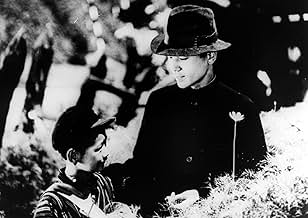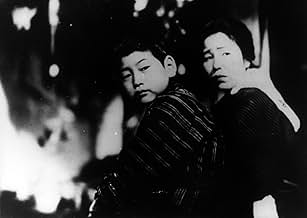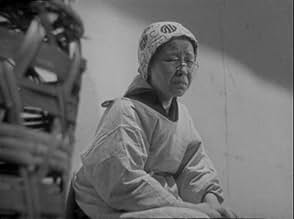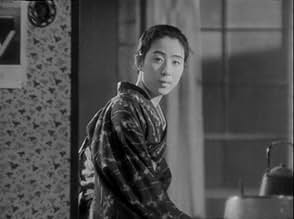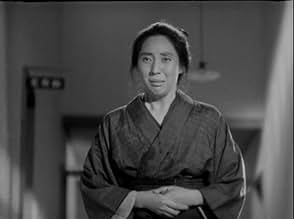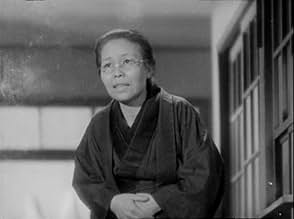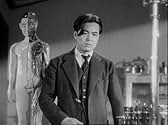AVALIAÇÃO DA IMDb
7,7/10
4,3 mil
SUA AVALIAÇÃO
Adicionar um enredo no seu idiomaA widow sends her only son away to receive a better education. Years later, she visits him, finding him a poor school teacher with a wife and son.A widow sends her only son away to receive a better education. Years later, she visits him, finding him a poor school teacher with a wife and son.A widow sends her only son away to receive a better education. Years later, she visits him, finding him a poor school teacher with a wife and son.
- Direção
- Roteiristas
- Artistas
Jun Yokoyama
- Okubo's son
- (as Bakudan Kozô)
Tomio Aoki
- Tomibo
- (as Tokkan Kozô)
Seiichi Katô
- Kinjo no ko
- (as Seiichi Kato)
- Direção
- Roteiristas
- Elenco e equipe completos
- Produção, bilheteria e muito mais no IMDbPro
Avaliações em destaque
It's quite striking that although this film was made 17 years before Tokyo Story, all the aspects of the film-making style we have come to associate with Ozu are already fully present. But compare this film with, say, his "Sono yo no tsuma", made just six years earlier in 1930: in that film --- a rather slavish attempt to copy the style of German Realism -- none of the visual and narrative features he shows here are present.
No one has mentioned (so I will...) -- that the German film which Ryosuke takes his mother to see (in which she falls asleep, and of which he self-referentially says "this is what they call a talkie") is Willi Forst's 'Leise flehen meine Lieder' (Vienna, 1933), and the lovely blonde actress seen running through the wheatfields is Louise Ullrich. This film (now largely forgotten) was a popular sensation in Europe at the time, depicting the love affair between Franz Schubert and the Countess Eszterhazy. Also... noticeable in a few scenes in Ryosuke's house is a large travel poster which says 'Germany'. All of which shows the extent to which European film-making was in the mind of the young Ozu. We think of Ozu as a purely "domestic" Japanese director (in every sense of that word), but in fact he was well-versed in the traditions of western film-making.
No one has mentioned (so I will...) -- that the German film which Ryosuke takes his mother to see (in which she falls asleep, and of which he self-referentially says "this is what they call a talkie") is Willi Forst's 'Leise flehen meine Lieder' (Vienna, 1933), and the lovely blonde actress seen running through the wheatfields is Louise Ullrich. This film (now largely forgotten) was a popular sensation in Europe at the time, depicting the love affair between Franz Schubert and the Countess Eszterhazy. Also... noticeable in a few scenes in Ryosuke's house is a large travel poster which says 'Germany'. All of which shows the extent to which European film-making was in the mind of the young Ozu. We think of Ozu as a purely "domestic" Japanese director (in every sense of that word), but in fact he was well-versed in the traditions of western film-making.
In 1923, in the province of Shinshu, the widow and simple worker of a silk factory Tsune Nonomiya (O-Tsune) decides to send her only son to Tokyo for having a better education. Thirteen years later, she visits her son Ryosuke Nonomiya (Shinichi Himori), and finds that he is a poor and frustrated night-school teacher with a wife, Sugiko (Yoshiko Tsubouchi), and a baby boy.
"Hitori Musuko" is a poignant, heartbreaking, sensitive and beautiful movie about expectations, frustrations, revelations and hope in life. Once again the major concern of Ozu is with the family and human relationship. In "Hitori Musuko", Ozu brilliantly uses the sound, recent in 1936, in the end of the simple but touching story, when the machines in the factory stop working symbolizing the death of Tsune. I saw this movie in a Brazilian cable television in a copy that certainly needs restoration, and I regret to inform that only "Ohayô" has been released on DVD in Brazil. Only in festivals, and occasionally in cable television, Brazilians have the chance to see the work of this great director. Seeing the number of votes of this masterpiece in IMDb (only 88 votes), I believe that the distribution problem of this film might be international. My vote is ten.
Title (Brazil): "Filho Único" ("Only Son")
"Hitori Musuko" is a poignant, heartbreaking, sensitive and beautiful movie about expectations, frustrations, revelations and hope in life. Once again the major concern of Ozu is with the family and human relationship. In "Hitori Musuko", Ozu brilliantly uses the sound, recent in 1936, in the end of the simple but touching story, when the machines in the factory stop working symbolizing the death of Tsune. I saw this movie in a Brazilian cable television in a copy that certainly needs restoration, and I regret to inform that only "Ohayô" has been released on DVD in Brazil. Only in festivals, and occasionally in cable television, Brazilians have the chance to see the work of this great director. Seeing the number of votes of this masterpiece in IMDb (only 88 votes), I believe that the distribution problem of this film might be international. My vote is ten.
Title (Brazil): "Filho Único" ("Only Son")
Of all the major directors in the world, Ozu was the last one to convert to sound; "The Only Son" was his first "all-talkie" film (in 1936), and it is remarkably inventive (technically) as well as deeply moving. Once again, his film deals with family dynamics: in this case, a widowed mother who has worked selflessly to provide her son with an education. But when she goes to visit him, she finds that he has not fulfilled his promise: he's stuck in a mediocre job, he has a wife and child and can't make any drastic changes because of his responsibilities. The ways that the mother and son try to reach an understanding, and their mutual resignation to the disappointments of life, create a glancing but powerful sense of that "quiet desperation" which was so often Ozu's theme.
The simple story follows Tsune (Choko Iida), a widow and single mother who struggles in a factory job to provide for her son Ryosuke. She sacrifices everything in her own life to pay to send Ryosuke off to the best middle and high schools, toiling away at her thankless job while never getting to see her son. It's not until many years later, when the now-grown Ryosuke (Shin'ichi Himori) gets a surprise visit from his mother at his Tokyo home, that the two assess their lives.
This was Ozu's first sound film, and he can't help but poke fun at the format, with one scene seeing Ryosuke and Tsune attending a "talkie" movie, the old woman's first, only for her to fall asleep during it. But while there are many moments of gentle humor, this is largely a serious affair, taking an unflinching look at familial obligation and expectation. The film asks what the true measure of a man is. Is it financial success, material wealth, a nice home and fat bank account? Or can it be strength of character and generosity of spirit? Ozu doesn't give any definitive answer, and the final sequence of the film leaves the true feelings of Tsune toward her son rather ambiguous.
This was Ozu's first sound film, and he can't help but poke fun at the format, with one scene seeing Ryosuke and Tsune attending a "talkie" movie, the old woman's first, only for her to fall asleep during it. But while there are many moments of gentle humor, this is largely a serious affair, taking an unflinching look at familial obligation and expectation. The film asks what the true measure of a man is. Is it financial success, material wealth, a nice home and fat bank account? Or can it be strength of character and generosity of spirit? Ozu doesn't give any definitive answer, and the final sequence of the film leaves the true feelings of Tsune toward her son rather ambiguous.
10soren19b
It is a shame that this film is not available for wider viewing. I had the opportunity of seeing it at an Ozu retrospective in Cleveland. This film measures up to the other great classic Ozu films. The impact of Ozu's films works in much the same way as Japanese painting. There is great power in its open spaces and silences. They lend greater power to the words and emotions that are expressed. The dignity of the characters as they struggle with life is moving. Ozu is a master
of world cinema because he deals with themes of universal import and he does so with impeccable style. Especially noteworthy in this film is his effective use of music and sound. All in all, a very worthwhile experience
of world cinema because he deals with themes of universal import and he does so with impeccable style. Especially noteworthy in this film is his effective use of music and sound. All in all, a very worthwhile experience
Você sabia?
- CuriosidadesThis was Yasujirô Ozu's first feature film with all-synchronous dialogue.
- ConexõesFeatured in A Train Arrives at the Station (2016)
- Trilhas sonorasOld Black Joe
Written by Stephen Foster
Principais escolhas
Faça login para avaliar e ver a lista de recomendações personalizadas
- How long is The Only Son?Fornecido pela Alexa
Detalhes
- Tempo de duração
- 1 h 22 min(82 min)
- Cor
- Mixagem de som
- Proporção
- 1.37 : 1
Contribua para esta página
Sugerir uma alteração ou adicionar conteúdo ausente

